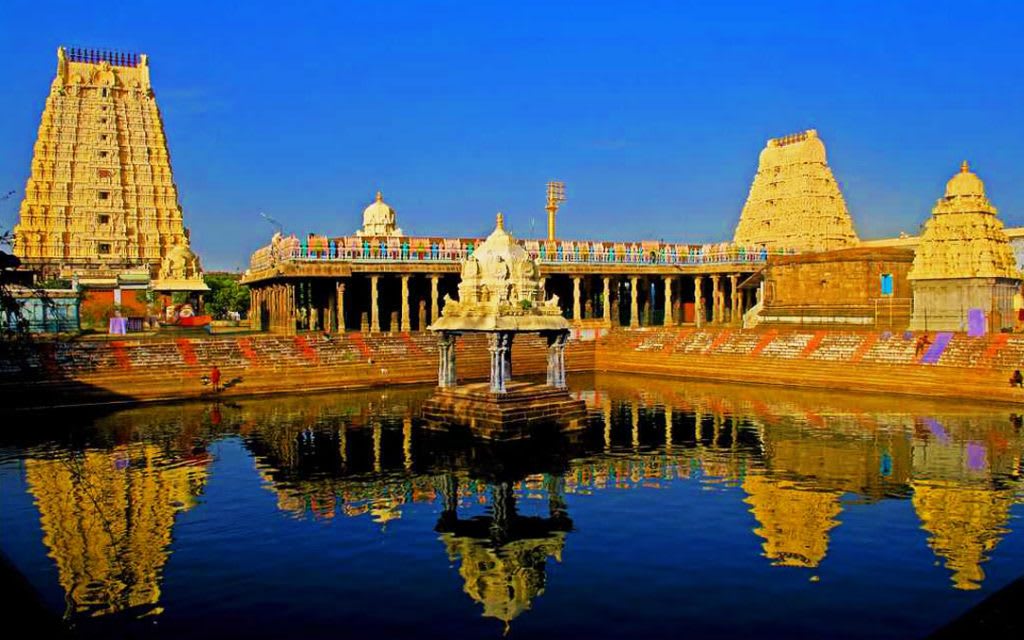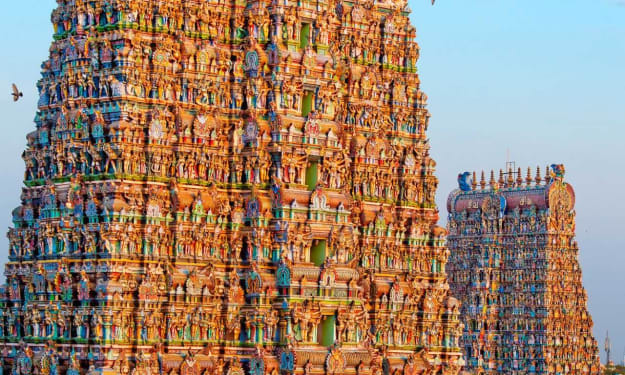
Kanchipuram, sometimes called Kanchi, is a city in the Tamil Nadu region of India. It is regarded as one of India's seven most sacred towns and is well known for its historic temples. The city has a long history and has always been a significant hub for academia, the arts, and culture. Kanchipuram, sometimes called Kanchi, is a city in the Tamil Nadu region of India. It is regarded as one of India's seven most sacred towns and is well known for its historic temples. The city has a long history and has always been a significant hub for academia, the arts, and culture.
The elaborate cultural past of the city is attested to by the Kanchipuram temples. Vaishnava, Shaiva, and Shakti are the three subcategories of Kanchipuram's temples. Each of these temples has a distinct architectural style and history.
At Kanchipuram, some of the most well-known Vaishnava temples are:
- Kailasanathar Temple - This is the oldest temple in Kanchipuram and was built by the Pallava King Rajasimha in the 8th century AD. The temple, which honours Lord Shiva, is well known for its exquisite architecture.
- Varadharaja Perumal Temple: In the 16th century AD, the Vijayanagara kings constructed this temple, which is devoted to Lord Vishnu. The gopuram, one of the highest in South India, is the temple's claim to fame.
- One of the biggest temples in Kanchipuram is the Ekambareswarar Temple, which honours Lord Shiva. The temple, which was constructed by the Pallava rulers in the seventh century AD, is well-known for its hall of 1000 pillars.
Many of Kanchipuram's well-known Shaiva temples include:
- Goddess Kamakshi, who is thought to be an incarnation of Goddess Parvati, is the subject of the Kamakshi Amman Temple. The temple, which was constructed by the Cholas in the 14th century AD, is well known for its exquisite architecture.
- The Pallava rulers constructed the Lord Shiva-dedicated Kachapeshwarar Temple in the sixth century AD. The temple, which is regarded as one of the best specimens of Pallava architecture, is well known for its beautiful carvings.
Some of the prominent Shakti temples in Kanchipuram are:
- The who, the what, the where, the when, the wherefore and the why of Murt..., but notphrased, not defeated, but defeated. This is a sur-. The temple was established by the Cholas in the 12th century AD and is notable for its yearly chariot event.
- One of the most potent Shakti temples in South India is Kanchi Kailasanathar Temple, which is devoted to Goddess Kali. The temple, which is well-known for its stone carvings, was built by the Pallava kings in the eighth century AD.
In conclusion, South India's rich cultural and architectural heritage is reflected in the Kanchipuram temples. In addition to being places of worship, these temples also serve as historical markers for the area. In conclusion, South India's rich cultural and architectural heritage is reflected in the Kanchipuram temples. In addition to being places of worship, these temples also serve as historical markers for the area.
The Kanchipuram temples are significant cultural and historical landmarks in India in addition to being important religious and spiritual centres. These temples are must-visits for visitors and devotees alike since they are not just architectural wonders but also because of their great mythological and historical ties.
Moreover, the three classifications of Kanchipuram temples are not the only ones that exist. Several temples can be found, including the Kanchi Kamakoti Peetham, one of the most significant Advaita Vedanta centres. The city also includes a number of Buddhist and Jain monuments, demonstrating the region's cultural variety.
Kanchipuram is well-known for its handwoven silk sarees, which are a representation of the city's traditional craftsmanship in addition to the temples. These sarees are well-known for their elaborate patterns and vivid hues and are a preferred tourist memento.
All things considered, Kanchipuram is a city of immense historical and cultural significance and a must-visit location for anybody interested in learning more about South India's rich legacy.
Apart from the temples and silk sarees, Kanchipuram also has several other attractions that draw visitors from around the world. Some of these attractions include:
Vedanthangal Bird Sanctuary is a well-known location for birdwatching and is home to a number of migratory bird species. It is located around 30 miles from Kanchipuram.
The Kanchi Kudil is a museum that depicts the way of life of the locals of Kanchipuram. The museum features a variety of antiques, such as furniture, costumes, and farming implements.
Thiruthani Murugan Temple is one of the six abodes of Lord Murugan and is noted for its picturesque setting and magnificent architecture. It is situated around 60 kilometres from Kanchipuram.
Covelong Beach is a stunning beach that is well-known for swimming, sunbathing, and water sports. It is around 40 miles from Kanchipuram.
Muttukadu Lake - This picturesque lake is a well-liked location for boating, fishing, and picnicking. It is situated around 25 miles from Kanchipuram.
Kanchipuram is a city that, on the whole, has something to offer everyone. Kanchipuram is a place that shouldn't be missed whether you're looking to explore the historic temples, buy traditional silk sarees, or simply take in the scenery.
Kanchipuram is well known for its cuisine, which is a delicious fusion of traditional Tamil flavours and influences from neighbouring states, in addition to its cultural and natural attractions. Idli, dosa, vada, pongal, and sambar are some of the well-known dishes of Kanchipuram, which are eaten with a variety of chutneys and sambars.
The Kanchipuram idli, a spiced variation of the conventional idli created with a combination of rice, lentils, and spices and cooked to perfection, is one of the must-try foods in Kanchipuram. The Kanchipuram dosa, which is a crispy dosa stuffed with a hot potato filling and served with coconut chutney and sambar, is another well-liked meal.
In addition to the regional food, Kanchipuram is well-known for the intensity with which its traditional festivities are observed. Popular Kanchipuram festivities include the following:
One of the greatest festivals in Kanchipuram is the 10-day Brahmotsavam, which is held at the Sri Varadaraja Perumal Temple. Dance, music, and colourful processions are used to celebrate the occasion.
Panguni Uthiram – This festival commemorates the union of Lord Shiva and Lady Parvati and is held at the Ekambareswarar Temple. A vibrant procession of gods, as well as musical and dancing performances, mark the celebration.
Mahashivratri is a festival that honours Lord Shiva and is observed in the Kailasanathar Temple. paraphrase: The event is observed with special prayers to the Lord.
“Tourism” is a term that has a number of different phrasess. Kanchipuram is a city that will captivate you with its beauty and charm, whether you're looking to explore the area's rich cultural past, indulge in local cuisine, or simply unwind on the stunning beaches.
In conclusion, Kanchipuram is one of India's seven most sacred towns and is a place of immense cultural and historical value. Ancient temples like those in Kanchipuram, which draw tourists and devotees from all over the world, are evidence of the region's rich cultural past. The region of South India's must-visit city is known for its cuisine, festivals, and natural beauty. Kanchipuram is a city that is sure to charm you, whether you are interested in discovering the city's architectural wonders, indulging in its delectable cuisine, or simply unwinding on its stunning beaches.






Comments
There are no comments for this story
Be the first to respond and start the conversation.